Understanding Sandplay
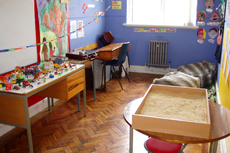
The sandplay room.
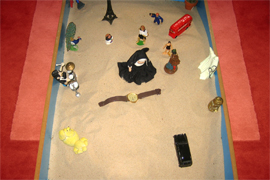
Sand tray with figures.
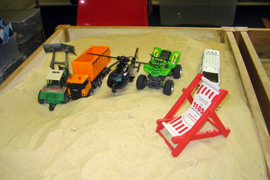
Sample of sand tray work by a child.

3 year old child whose parents are separating.
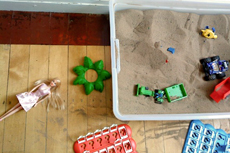
5 year old boy whose mother is outside the home in hospital.

8 year old boy whose father had died suddenly of an overdose. Figurine of ghost with a ball and chain allowed the child to express his shame that his father had been in prison.
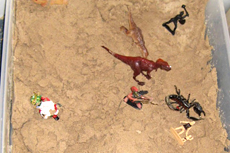
8 year old child who wanted to kill all human beings in the world except for Santa Claus.

10 year old girl abandoned by her mother.

10 year old child with representations of family of 2 younger siblings, mother and uncle.
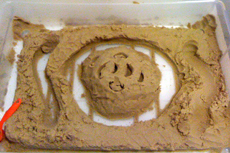
13 year old who said she did not need help!
(Identities changed to protect clients)
Information for Teachers
Once a PIPS assistant psychologist is assigned in your school, the teachers become their first line of communication. Teachers can refer any child that they have concerns about, for example:
- Children with behavioural problems, such as hyperactivity and inattention that affects academic achievement and/or relationships with parents, teachers and peers.
- Children who are experiencing educational difficulties that may need assessment to determine if additional learning supports are required in the classroom.
- Children who display signs of anxiety, depression or social withdrawal.
- Children who have or are currently experiencing family problems, such as abuse, bereavement, bullying, family breakdown, trauma or domestic violence.
A meeting will be organised with the Assistant Psychologist and other relevant staff (e.g. teachers, Guidance Counsellor, Principal) to discuss what the child needs and how to best meet these needs. Parents will be asked to sign a consent form, consenting to classroom observations, weekly therapeutic sessions or assessment, depending on the outcome of the meeting.
Once the consent form has been signed, PIPS can provide the child with the following services, depending on their needs:
- Behavioural and/or academic assessments can be carried out, followed by a written psychological report.
- One-to-one support sessions with the Assistant Psychologist on a weekly basis during school hours.
- An individualised behavioural intervention that will aim to reduce difficult or problematic behaviours at home and at school.
- Schools will be kept up-to-date on each child, with a two-way communication system between Assistants and teachers to ensure the child's behaviour and progress is monitored. All reports and assessments will be passed on to the Principal. All information about children will be kept strictly confidential.